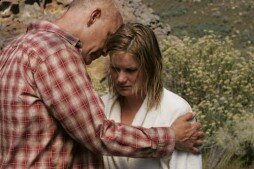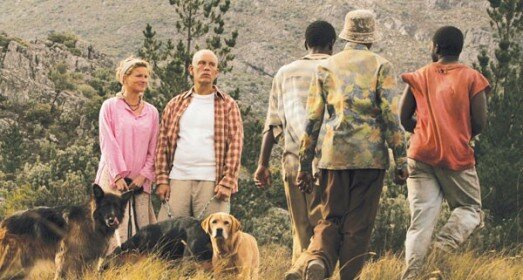South Africa’s Apartheid and its aftermath remain popular subjects in Australia’s literary mainstream today, widely accessible through the works of Bryce Courtenay and J.M. Coetzee. The latter, an Adelaide resident since 2002, now has his Booker Prize-winning novel Disgrace translated to the screen, an intriguing film from director Steve Jacobs which deals with animal cruelty, family relations and racial tension.
The Australian-South African co-production sees the team responsible for La Spagnola (Jacobs and screenwriter Anna Maria Monticelli) behind the story of David Lurie (John Malkovich). His shift from Cape Town University professor to rural Western Cape is unavoidable after the fallout of his affair with a black student, but as he spends more time with daughter Lucy (Jessica Haines) in the country his uncertainty about life is highlighted. That uncertainty includes the nature of helper Petrus (Eriq Ebouaney), hints of racial tension rising as David mistrusts him.
Disgrace sets itself up as more of a character piece as life on the Western Cape becomes settled, revealing to David just how opposite his was in the city. The encounter that shakes David and Lucy to the core (as it does you with implied actions of animal and physical violence) shatters their confidence and changes their actions as they try to re-piece themselves together again. While at first glance the child has her life together as the father is still searching for answers, the contrast evolves as the roles subtly reverse in the aftermath. This is where Jessica Haines shines as Lucy, a woman who already had unfinished business but with more heaped upon her is incapable of dealing with the consequences rationally. John Malkovich is strong as David, with a hint of eeriness around him as always, learning about himself through everyone he meets, but also relearning the fatherly instinct long unused. The supporting cast is solid, particularly Ebouaney’s Petrus, an uneasy character too acceptant of what happens around him.
 |
Director Jacobs handles Disgrace well visually, making use of the South African landscape beautifully with Steve Arnold’s cinematography, but the story is at times disparate in pace as the major moments work hard to sustain the plot in between. However, the film is strengthened by its metaphoric undertone as we learn more about David in a post-Apartheid world – during his time as a professor, he reveals himself to students through his teachings of romantic poetry, while both racial preferences and tension are reflected in his meetings with student Melanie and Petrus. David’s life is uncertain from start to finish, but it’s a reflection of modern life and its consequences.
Verdict:
An important contemporary look at South Africa, Disgrace succeeds in outlining the instability of life with Malkovich and Haines strong in their central roles.
Read our exclusive Interview with Disgrace director Steve Jacobs here.
[Rating: 3.5/5]
 Follow the author Katina Vangopoulos on Twitter.
Follow the author Katina Vangopoulos on Twitter.
















